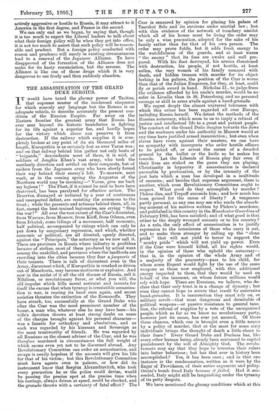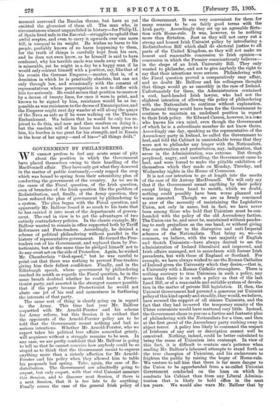T would have taxed the gloomy power of Tacitus, that
supreme master of the condensed eloquence for which scarcely any language but the Roman is an adequate vehicle, to describe accurately the present con- dition of the Russian Empire. Far away on the Eastern frontier the greatest army that Russia has over sent beyond its historic boundaries is fighting for its life against a superior foe, and hardly hopes for the victory which alone can preserve it from destruction. If the railway which supplies it is com- pletely broken at any point of its six thousand miles of length, Kuropatkin is as certainly lost as ever Varus was ; and on that railway behind him gather not only hosts of " brigands," descendants most of them, it is said, of soldiers of Jenghis Khan's vast army, who took the northerly direction and settled on their conquests, but of raiders from the Japanese army who have slowly forced. their way behind their enemy's left. To-morrow, next week, or in the coming spring the Augustus of the Northern world may be moaning—" Varus, give me back my legions !" The Fleet, if it cannot be said to have been destroyed, has been paralysed for effective action. The Reserves, dismayed , or irritated by a year of continuous and unexpected defeat, are resisting the summons to the front ; while the peasants and artisans behind them, all, in fact, except the best-trained legionaries, are crying " Stop the war ! All over the vast extent of the Czar's dominion, from Warsaw, from Moscow, from Kieff, from Odessa, even from Irkutsk, come tidings of a movement, half economic, half political, accompanied by risings which can only be put down by sanguinary repression, and which, whether economic or political, are all directed, openly directed, against the " Principate," the autocracy as we now call it. There are provinces in Russia where industry is profitless because of strikes, most of them produced by actual want among the unskilled, and provinces where the landlords are crowding into the cities because they fear a jacquerie of their tenants. .There is talk of discontent even in the Army, discontent which, if Kuropatkin is crushed or driven out of Manchuria, may become mutinous or explosive. And now in the midst of it all the old disease of Russia, call it Nihilism, or revolutionary furor, or what you will, the old impulse which kills moral restraint and invents for itself the excuse that when tyranny is irresistible assassina- tion is war, is rearing its head once again, and secret societies threaten the extinction of the Romanoffs. They have struck, too, successfully at the Grand Duke who after the Czar was the most prominent member of the house, a man who, whatever else he may have been—his wife's devotion throws at least strong doubt on some of the charges brought against his personal character— was a fanatic for orthodoxy and absolutism, and as such was regarded by his kinsman and Sovereign as the most trustworthy of friends. He was regarded by all Russians as the closest adviser of the Czar, and he was therefore murdered in circumstances the full weight of which seems even yet not to be discerned abroad. Any Revolutionary Committee can order an assassination, and escape is nearly hopeless if the assassin will give his life for that of his victim ; but this Revolutionary Committee must have agents even in palaces, or how did its instrument know that Sergius Alexandrovitch, who took every precaution he or the police could. devise, would be passing the precise spot at the precise time when his carriage, always driven at speed, could be checked, and the grenade thrown with a certainty of fatal effect ? The Czar is censured by opinion for placing his palace of Tsarskoe Selo and its environs under martial jaw; but with this evidence of the network of treachery amidst which all of his house must be living the order may be only a wise precaution, adopted for the sake of his family rather than for that of his own person. The order may prove futile, but it adds fresh energy to the watchfulness of the guards, and at least warns " the enemy " that its foes are awake and well pre- pared. With his fleet destroyed, his armies threatened with destruction, his people, if not hostile, at least sullen, the very women of his family menaced with death, and hidden treason with murder for its object lurking in his palaces, the position of the Czar is worse than that of the Julian Emperors, for they, at least, could fly or perish sword in hand. Nicholas II., to judge from the evidence afforded by his uncle's murder, would be no safer in Livadia than in St. Petersburg, and no personal courage or skill in arms avails against a hand-grenade. We regret deeply the almost universal tolerance with which this crime has been regarded. all over Europe, including Russia herself. We detest the methods of the Russian autocracy, which seem to us to imply a refusal of justice and intellectual life to a great and patient people. The conduct of the Grand Duke Sergius towards the Jews and the workmen under his authority in Moscow would at any time have justified armed insurrection; but even when slaves have risen against their masters, we can have no sympathy with insurgents who order hostile officers to be picked off, or arrest the career of a dreaded general by the bullet or the knife as he makes his rounds. Let the Liberals of Russia play fair even if their lives are staked on the game they are playing. Christianity is hypocrisy if assassination is declared excusable by provocation, or by the intensity of the just hate which a man has developed in a multitude of enemies ; and besides that supreme argument, there is another, which even Revolutionary Committees ought to respect. What good do they accomplish by murder ? Plehve dies, and Trepoff succeeds him ; and how much has been gained for the cause of liberty ? A vengeance partly personal, as any one may see who reads the absorb- ing account of his motives written by Plehve's murderer, and published in this country in the Manchester Guardian of February 18th, has been satisfied; and of what good is that either to the deeply wronged assassin or to his country ? As a rule, the only effect of assassination is to justify repression to the consciences of those who carry it out, and to make them stronger by calling up the " clean pride " that will not yield to terror to support the " mucky pride " which will not yield up power. Even if the Czar were himself killed, all his rights would, in the opinion of those who uphold the autocracy— that is, in the opinion of the whole Army and of a majority of the peasantry—pass to his child, for whom some Regent would fight by the use of the same weapons as those now employed, with this additional energy imparted to them, that they would be used on behalf of the innocent, on whose future millions would. rely with hope. There are Russians, we believe, who de- clare that their only trust is in a change of dynasty ; but even they cannot hope to secure that result by successive band-grenades. It is insurrection they must rely on, or military revolt—that most dangerous and detestable of political weapons—or passive resistance to general taxa- tion, the refusal of supplies by a vote of the unorganised people, which so far as we know no revolutionary party, however just its cause, has ever yet secured. Of those three chances, which one is brought even a little nearer by a policy of murder, that at the most for some sixty individuals brings the thought of death a little closer to their fears ? Every Grand Duke and Duchess has, like every other human being, already been sentenced to capital punishment by the will of Almighty God. The revolu- tionists may say that they hope to terrorise their rulers into better behaviour; but has that ever in history been accomplished ? Yes, it has been once ; and in that one instance is the condemnation, written as it were by the finger of Providence, of their entire argument and policy. Orsini's bomb freed Italy because it failed. Had it suc- ceeded, Italy might still be languishing under the tyranny of its petty despots.
We have mentioned the gloomy conditions which at this moment surround the Russian throne, but have as yet omitted the gloomiest of them all. The man who, in circumstances almost unparalleled in history—for Philip II. of Spain lived safe in the Escorial—struggles to uphold that awful sceptre, and even to carry it upwards over one more hill, is unequal to its weight. He wishes no harm to his people, probably knows of no harm happening to them, for the truth of things is carefully kept from his ears, and he does not even know, as he himself is said to have confessed, why his terrible uncle was made away with. He is miserable, yet he might in a day be a happy man if he would only content himself with a position, say, like that of his cousin the German Emperor,—master, that is, of a dominion in which he is practically absolute, but can act only through law, and occasionally with the consent of representatives whose preoccupation is not to differ with him too seriously. He could secure that position to-morrow by a decree of twenty lines, for once it were in print, and known to be signed by him, resistance would be as im- possible as was resistance to the decree of Emancipation, and the Emperor might next day wander at will along the quays of the Neva as safe as if he were walking on the Thames Embankment. We believe that he would be only too re- joiced to do this, and now and then resolves on doing it ; but the resolute will of his house has not been given to him, his burden is too great for his strength, and in Russia in the hour of her agony—and of his—" all things drift."







































 Previous page
Previous page